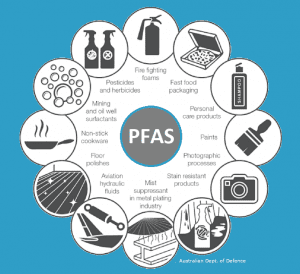Wisconsin needs standards for PFAS. Now.
Wisconsin Lakes Supports WDNR Rulemakings to set standards and rules for emerging pollutant levels in surface, ground, and drinking waters.
Wisconsin Lakes submitted comments to the Wisconsin Department of Resources (WDNR) this week in support of three rulemakings that would set water quality standards or acceptable limits for the presence of “PFAS”, a class of pollutants being found more and more often in our waters.

Poly-and perfluoroalkyl substances (PFAS) are found in fire-fighting foam and many heat resistant products (such as the lining of some cookware). These chemicals are harmful to human health, especially in developing fetuses and infants. What’s more, once in the environment they not only don’t dissipate, they tend to “bio-accumulate”, or build up in higher concentrations as animals higher in the food chain eat contaminated prey, in the same way that more familiar pollutants like lead and mercury do.
Because this an emerging problem in the waters of Wisconsin, the state doesn’t have water quality standards for surface waters or groundwater or a limit on how much of the chemicals are safe in our drinking water. WDNR is undertaking three rulemakings to set rules and standards for PFAS, and the public comment period for the “scope statements” for those rules just closed. Scope statements are the first step in a rulemaking, where the agency is given permission to draft the actual rules. Industry and the makers of these chemicals are pushing back hard, trying to stop the rules from even being drafted, but Wisconsin Lakes is hopeful these rules, necessary to for the health, safety, and welfare of Wisconsinites and visitors to our state, will be approved and the rulemakings will proceed with all due haste. You’ll have ample opportunities to weigh in on this issue as it works through the rulemaking process, which can take several years.
We’ll keep you posted as the rulemakings progress so you can weigh in on the important issue. In the meantime, here are some resources to learn more:

